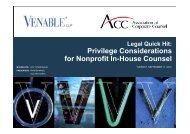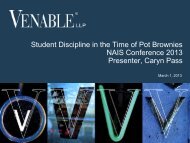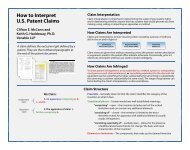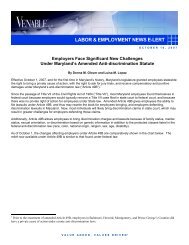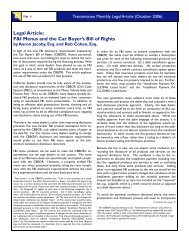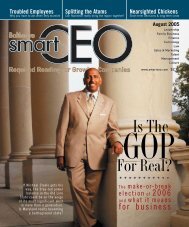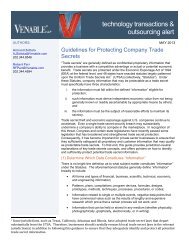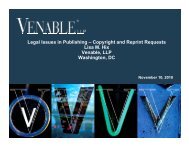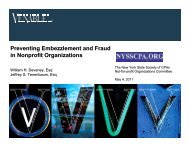The New IRS Form 990: What Does It Mean For Your ... - Venable LLP
The New IRS Form 990: What Does It Mean For Your ... - Venable LLP
The New IRS Form 990: What Does It Mean For Your ... - Venable LLP
Create successful ePaper yourself
Turn your PDF publications into a flip-book with our unique Google optimized e-Paper software.
Retirement Programs for Non-Profit Organizations and<br />
Governments<br />
State and local governmental units and non-profit organizations are subject to unique<br />
legal requirements as they design, fund and administer retirement programs for their<br />
valued workers. <strong>Venable</strong>'s Employee Benefits and Executive Compensation Group has<br />
particularly deep knowledge about the specialized—and often arcane—rules that apply to<br />
such plans. Not only do we work closely with our clients to ensure that their retirement<br />
programs meet all compliance requirements, we also partner with our clients and their<br />
consultants to help them evaluate whether they should migrate from traditional<br />
retirement programs to more contemporary solutions. Of added value, we also structure<br />
deferred compensation plans and other innovative programs that are designed to<br />
supplement retirement savings, so that governments and nonprofit organizations of all<br />
types can attract and retain their key contributors.<br />
Health and Welfare Benefit Plans<br />
In recent years, there has been explosive growth in the number and range of health and<br />
welfare benefit programs that employers offer, as they strive to provide their employees<br />
with choices about their benefits. In today's marketplace, it is common for employers to<br />
offer a range of medical and disability coverage options, as well as dependent care<br />
assistance plans, educational and tuition assistance programs, long-term care insurance,<br />
paid time off and other leave plans, and work/balance flexibility programs. At the same<br />
time, the level of regulatory oversight and complexity has increased exponentially,<br />
creating an "alphabet soup" of laws with which these plans must now comply, including<br />
the continuing coverage requirements of COBRA, the portability, nondiscrimination,<br />
privacy and security requirements of HIPAA, and the requirements for certain minimum<br />
benefits under a variety of other laws such as the NMHPA (<strong>New</strong>borns' and Mothers'<br />
Health Protection Act), MHPA (Mental Health Parity Act) and WHCRA (Women's<br />
Health and Cancer Rights Act). <strong>Venable</strong>'s Employee Benefits and Executive<br />
Compensation Group provides comprehensive and technical advice on all of these legal<br />
requirements.<br />
We regularly review and draft plan documentation, summary plan descriptions,<br />
employee benefit guides, and other communication materials for health and welfare<br />
benefit plans of all types—whether the plans are broad-based or limited to executives<br />
only, fully-insured or self-insured, company-subsidized or purely voluntary, funded or<br />
unfunded—all with the goal of ensuring that our clients comply with the wide range of<br />
federal and state laws and regulations affecting these plans. <strong>For</strong> example, we have<br />
structured comprehensive compliance programs, with written policies, procedures and<br />
training, that implement the privacy and security requirements of HIPAA, in order to<br />
ensure the confidentiality, integrity, and availability of health information that is held and<br />
used by our clients' health plans. <strong>For</strong> all kinds of welfare plans, we also negotiate vendor<br />
contracts, redesign their claims and other administrative processes, and help coordinate<br />
the administration of claims with other sources of reimbursement and coverage to ensure<br />
WWW.VENABLE.COM




